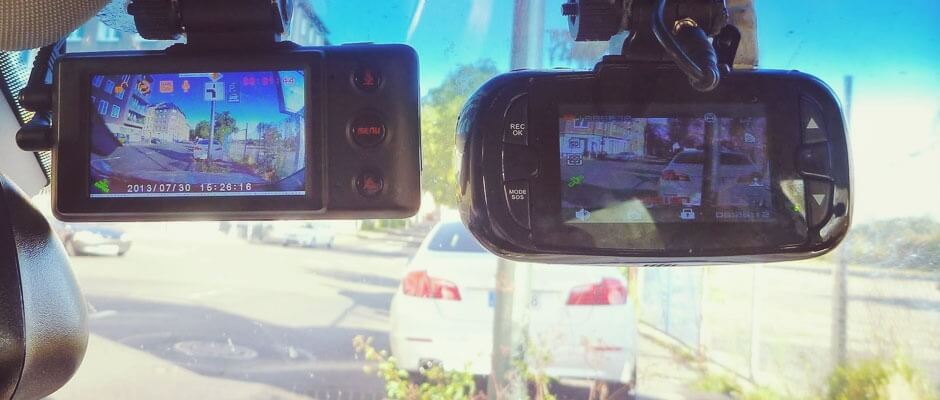Imagine collecting your car from the meet and greet lounge at the airport, having returned from a relaxing holiday, to find something seriously wrong with your car. This is what happened to Sally Hawes. Sally 40, from Harpenden, called the airport to complain, but the airport denied all responsibility. Unfortunately for the meet and greet service Sally had an ace card up her sleeve – her dashcam had recorded everything that had happened to the car while she’d been away. Thanks to her dashcam she was able to prove that the meet and greet service was conclusively at fault. Its staff had abused the car and had driven it at unacceptable speeds over speedbumps resulting in bald tyres and a damaged suspension. Thanks to the dashcam’s unequivocal evidence – which also picked up the commentary and revealed the identity of the drivers – the company had to pay out £6000 in damages. Her car was fitted with a Roadscan dash cam, recording on a permanent loop.
Sally is in no doubt as to the importance of her dashcam. She says: “I cannot ever see myself driving without a dashcam. It gives me peace of mind, security and makes me feel safe on the road”.
The dashcam is yet another piece of in-car technology with an increasingly large fan club in the UK and it seems we can’t get enough of it. David Barton, a motoring lawyer from Kent believes that by 2020 there could be as many as a million vehicles fitted with dashcams in the UK¹. And sales of dashcams seem to be soaring. Halfords, which sells a range of dashcams saw a 150 per cent rise in sales over the 2013-14 Christmas period².
According to research from the RAC, 4 per cent of drivers have dashcams in the UK and four in 10 owners are considering fitting one³. But what is it about dashcams that is so appealing? According to RAC research, six out of 10 (59%) said they wanted a dascham in order to record of what happens in case of an accident and a fifth (21%) wanted protection against ‘crash for cash’ scams⁴. It’s not only drivers who are increasingly keen on dashcams; one of the UK’s largest motoring organisations has invested in them too. In October 2014 the RAC launched its own dashcam – the RAC Car Cam – in an effort to help combat insurance fraud, which has sent car insurance premiums skyrocketing in recent years.
In its ‘No Hiding Place, Insurance Fraud Revealed Report’ the Association of British Insurers (ABI) reveals that in 2011 insurers uncovered 139,000 bogus insurance claims worth £1bn and it estimates that a further £2bn of insurance fraud is still undetected⁵. It also states that insurance fraud adds £50 to drivers’ premiums each year⁶. Not only does this hit consumers’ pockets but it results in higher and higher numbers of motor insurance claims, which can be stressful for drivers and complicated to resolve.

An additional benefit of dashcams is that some UK insurers are now offering discounts if a dashcam is installed. It’s even possible that in the future cars will be manufactured with in-built dashcams as standard.
Despite the positives, dashcams have their limitations. In the event of an accident, the footage can’t be automatically processed or analysed (unlike telematics data) and relies wholly upon the driver to download it. It also puts the onus on the driver to prove their innocence in the event of a claim and is time intensive. And while they are a quasi-monitoring device they don’t have as much ability as telematics to actively moderate driving behaviour or have a preventative effect. Nor can they provide an end-to-end view of an incident or capture everything, unlike telematics data.
There is also the potential for distracted driving. We already have a range of technology in cars which takes our eyes away from the road – CD players, mobile phones and satellite navigation systems, not forgetting a raft of new technology due to come on board as part of the drive towards the Connected Car. Michelle Black, 40 from Wheathampstead, who bought her dash cam to provide documented evidence in the event of an accident, believes that a dashcam is “no more a distraction than my in-car CD player or satellite navigation system”. But there is no formal research on the impact of dash cams on driving behaviour and as dashcams are still in their relative infancy in the UK it is impossible to know whether they will result in more cases of distracted driving.
In the meantime, David Barton, motoring lawyer, offers the following advice: “you must not block your view of the road, or allow yourself to be able to see the screen of the camera as you are driving. You need to be in proper control of the vehicle at all times, and as with mobile phones, they must not be permitted to become a distraction”⁷.
But dashcams offer too many benefits for us to ignore. If used alongside telematics-based, black box car insurance, the dashcam could become a key weapon against insurance fraud and bogus motor claims. This dynamic duo could make a serious dent in insurance fraud, while providing drivers with security and protection on the road.
Sources:
[1] http://www.motorists-lawyer-kent.co.uk/resources/filer.rhtm/754905/dashcam+-+the+new+must-have+accessory.pdf[2] http://www.independent.co.uk/life-style/motoring/motoring-news/smile-youre-on-dashcam-camera-more-motorists-are-installing-incar-recorders-to-capture-instances-of-bad-cycling-and-driving-9101712.html
[3] [4] http://www.rac.co.uk/press-centre/press-releases/should-in-car-cameras-be-compulsory-to-banish-cras
[5] [6] https://www.abi.org.uk/~/media/Files/Documents/Publications/
Public/Migrated/Fraud/ABI%20no%20hiding%20place%20-
%20insurance%20fraud%20exposed.ashx
[7] http://www.motorists-lawyer-kent.co.uk/resources/filer.rhtm/754905/dashcam+-+the+new+must-have+accessory.pdf
